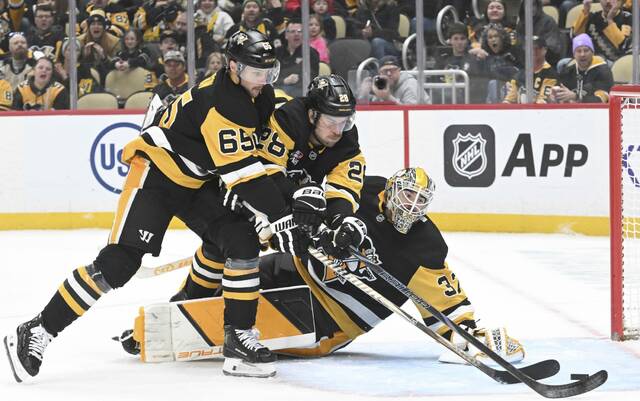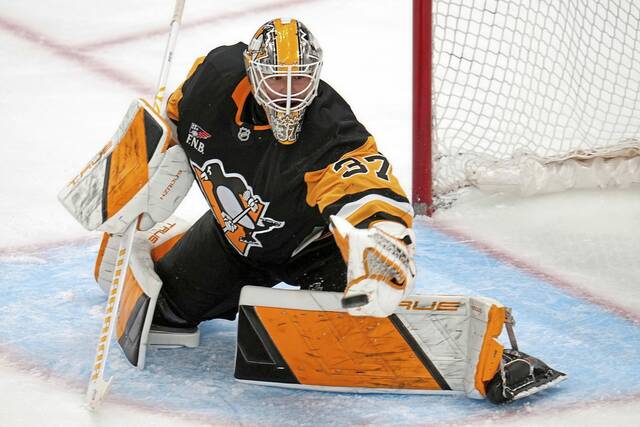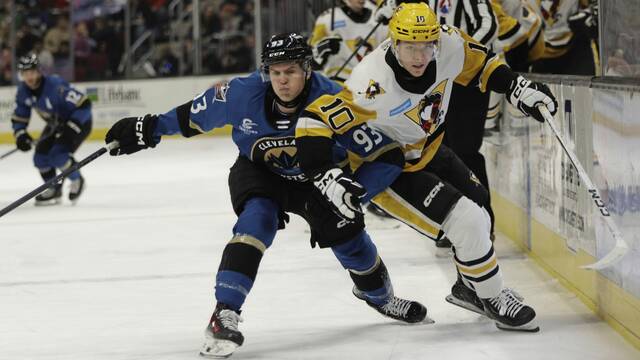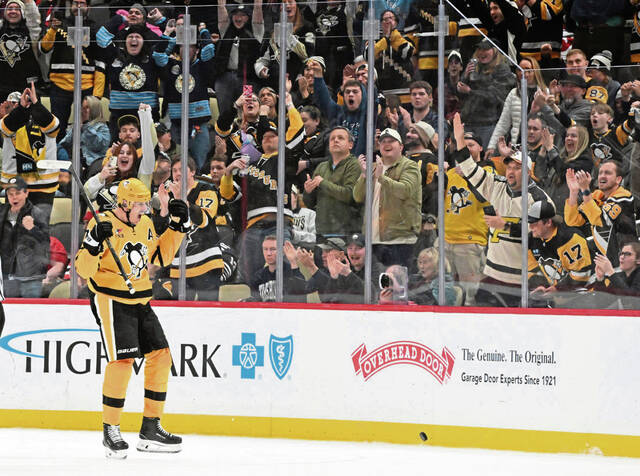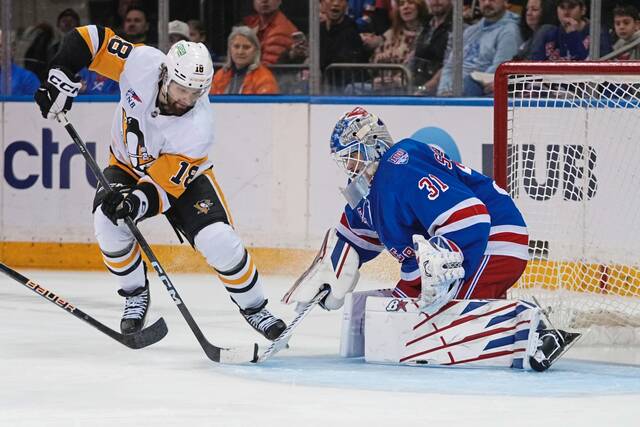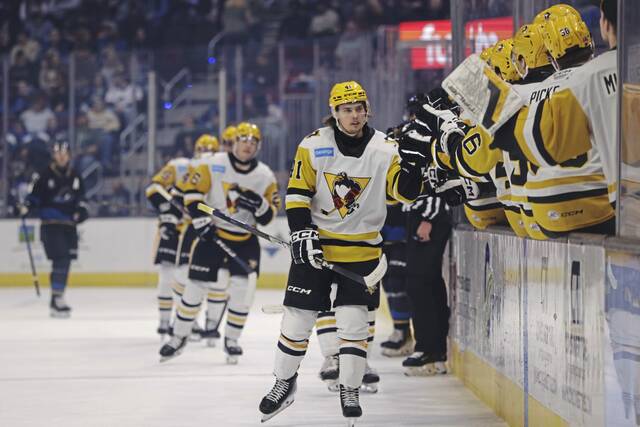While the NHL is on hold because of the ongoing coronavirus pandemic, the Tribune-Review will offer the Double Team project, an examination of the five best players who have contributed substantially to the Penguins and another franchise. For consideration, a player must have played at least the equivalent of a full season for each franchise. (Sorry, Jarome Iginla fans.)
Today, a look at the Minnesota Wild. Entering the NHL as part of the 2000 expansion, the Wild is based St. Paul, Minn. In 27 all-time games against the Wild, the Penguins have a 13-12-2 record.
1.) Pascal Dupuis, right winger
Dupuis probably should have been drafted in the middle rounds of the 1997 draft. But a broken leg during his first season in the Quebec Major Junior Hockey League (QMJHL) ended those hopes.
But not his dream. With the benefit of a 50-goal campaign in his final season with the QMJHL’s Shawinigan Cataractes, Dupuis earned an entry-level contract as an undrafted free agent with the expansion Wild in September 2000.
After debuting in 2000-01, Dupuis proved he was a full-time NHLer in 2001-02 by playing in 76 games and recording 15 goals and 27 points.
The following season, Dupuis was part of a crew of misfits and castoffs who came together as the best team in the Wild’s 19-year history. With the benefit of Dupuis reaching the 20-goal mark in 80 games, the Wild, under the guidance of defensive-minded coach Jacques Lemaire, frustrated the Colorado Avalanche and Vancouver Canucks in the first two rounds of the playoffs to reach the 2003 Western Conference final for the first and only time in franchise history.
Dupuis and the Wild never enjoyed the same success, failing to reach the postseason over the next two seasons but he remained a speedy forechecker reliable for reaching double-digit figures in goals. On Feb. 9, 2007, he was traded to the New York Rangers. After a brief stay in Manhattan, he was dealt to the Atlanta Thrashers on Feb. 27
Less than a year later – 364 days to be exact – Dupuis was part of a blockbuster trade when he was sent to the Penguins with All-Star forward Marian Hossa for forwards Colby Armstrong, Erik Christensen, forward prospect Angelo Esposito and a 2008 first-round pick.
Dupuis was more of a throw-in with the trade, but he had the longest impact of any of the assets involved.
Along with Hossa, Dupuis flanked franchise center Sidney Crosby and helped the Penguins reach the 2008 Stanley Cup Final, losing to the Detroit Red Wings. A year later, Dupuis was relegated to a lesser role in the bottom six and was even scratched occasionally, but held the Stanley Cup above his head in June 2009.
Following the retirement of forward Bill Guerin in 2010, Dupuis found himself back on Crosby’s line full-time, along with Chris Kunitz, and in 2010-11, helped Crosby race out to a seemingly insurmountable lead in the scoring race. But a concussion suffered on New Year’s Eve during an outdoor game at Heinz Field virtually ended Crosby’s season.
In 2011-12, despite Crosby’s lingering health woes, Dupuis established a career-high in goals (25) and points (58) in 82 games. By the lockout-shortened season of 2012-13, Crosby was fully healthy and reunited with Kunitz as well as Dupuis, who managed to put up 20 goals and 38 points in 48 games.
Dupuis was once again running by Crosby’s right side through the early stages of 2013-14 until a serious knee injury in December sent his career into a tailspin. After missing the remainder of that campaign, he returned to the lineup for 2014-15 but a blood clot related to his knee ailment ended his season once again.
He tried to power through the 2015-16 season despite his condition but by December of 2015, he decided the risk wasn’t worth it and unofficially retired. His last moments in uniform came in June 2016 as he held the Stanley Cup with his teammates.
2.) Matt Cullen, center
When he joined the Wild as a free agent in the 2011 offseason, the Minnesota-born Cullen, then 33, was living out a dream, playing for his hometown team (even though he grew up a fan of the North Stars franchise).
During his first run with the Wild over three seasons, Cullen offered plenty of speed, sound two-way play, aptitude in the faceoff circle and even a little offense.
After helping the Wild reach the postseason in 2012 and ‘13, he was on the move again, joining the Nashville Predators as an unrestricted free agent.
Following a two-year stint in Nashville, Cullen considered retirement before his former general manager with the Carolina Hurricanes, Jim Rutherford, asked him about playing for his new team, the Penguins, in August 2015.
Cullen joined the Penguins and in the process, became one of the most respected players in franchise history. Buttoning down the fourth line and the penalty kill, Cullen also served as a veteran mentor and helped the Penguins win the Stanley Cup in 2016 as well as ‘17.
Staving off retirement, he opted to sign with the Wild once again, in hopes of riding off into the sunset at home in 2017-18. But an unsatisfactory relationship with coach Bruce Boudreau prompted him to come back for one last season with the Penguins in 2018-19. Putting up 20 points in 71 games, Cullen retired for good at the age of 41 after the Penguins were swept in the first round.
3.) Richard Park, right winger
As one of the relatively few successful second-round draft picks in Penguins history, Park, who was drafted in 1994, had a remarkably long career for an undersized (5-foot-11, 190 pounds) player who largely existed in an era when general managers coveted size above most skills.
One of only two South Korean-born players in NHL history (ex-Penguins defenseman Jim Paek is the other), Park debuted with the Penguins in 1994-95 but showed he could stick in the NHL during the 1995-96 campaign as a quick bottom-six defensive forward, appearing in 56 games and posting 10 points.
The Penguins traded him to Anaheim in March 1997 and for the next three seasons, he barely hung onto his NHL career, playing only 33 regular season games with the Mighty Ducks and Philadelphia Flyers over that span.
After signing with the expansion Wild in 2000, Park resurrected his career by 2001-02, playing in 63 games and posting 25 points.
During the Wild’s surprising run in the 2002-03 postseason, Park appeared in 18 games and contributed six points, including an overtime goal in a 3-2 win against the Avalanche in Game 6 of a Western Conference quarterfinal series.
Park lasted another season in Minnesota before joining the Canucks as a free agent in August 2005.
Six years later, Park returned to the Penguins as a free agent. Inhabiting a bottom-six role serving as a penalty killer, Park played in 54 games and put up 14 points in 2011-12.
Following the season, he joined Ambri-Piotta in Switzerland.
4.) Matt Cooke, left winger
After the departure of the rambunctious Jarkko Ruutu during the 2008 offseason, Penguins general manager Ray Shero needed a left winger for his third line and signed the detested Cooke. And in five seasons with the Penguins, Cooke did quite a bit to reward Shero’s faith.
Lining up with Tyler Kennedy and Jordan Staal, Cooke gave the Penguins a reliable presence on the third line that mixed in an element of physicality with a touch of offense. That trio helped batter the exhausted Red Wings in the Stanley Cup Final and was vital to the franchise’s third championship.
A steady threat to reach double-digit figures during his five seasons in Pittsburgh, Cooke was also a steady threat to the opposition. After missing 21 games throughout the 2010-11 season due to suspension for various infractions, Cooke underwent counseling and extensive one-on-one coaching to clean up his game.
In 2011-12, Cooke appeared in all 82 games and incurred only 44 penalty minutes, the lowest total in his career since debuting in the late 1990s. He even earned the team’s nomination for the Bill Masterton Memorial Trophy, which recognizes sportsmanship and dedication.
After walking a straight line throughout the shortened 2012-13 season only 36 penalty minutes in 48 games, Cooke was allowed to walk as a free agent and joined the Wild in July 2013.
Cooke played in all 82 games of the 2013-14 campaign and helped the Wild reach the second round of the playoffs. But during that postseason, he showed his stripes with an ugly hit that injured Avalanche defenseman Tyson Barrie during the first round.
Injuries limited Cooke to 29 games in 2014-15, and he retired following the season.
5.) Eric Fehr, right winger
Fehr’s best days were behind him when he joined the Penguins as a free agent in July 2015. But the Penguins didn’t need him to be the 20-goal threat he was earlier in his career with the Washington Capitals. They just needed him to be versatile bottom-six forward who was a good citizen in the dressing room.
Injuries limited him to 55 games and 14 points throughout the 2015-16 season. But he earned enduring respect from his teammates in December 2015 when, at the age of 30, he got into his first career fight with Columbus Blue Jackets forward Brandon Dubinsky, a longtime nemesis of Crosby.
In the postseason, Fehr formed a sturdy fourth line with Cullen and Tom Kuhnhackl which helped the Penguins claim the Stanley Cup. Fehr’s two game-winning goals that spring were second only to Crosby.
The following season, Fehr’s skating wouldn’t allow him to keep up with how coach Mike Sullivan wanted the team to play and by March of 2017, he was traded to the Toronto Maple Leafs.
After bouncing around with the Maple Leafs and San Jose Sharks, Fehr signed with the Wild in July 2018 to be reunited with Boudreau, his coach in Washington. Primarily used on the fourth line, Fehr appeared in 72 games and contributed 15 points before joining Geneve-Servette Switzerland as a free agent during the 2019 offseason.
Honorable mention: None.



